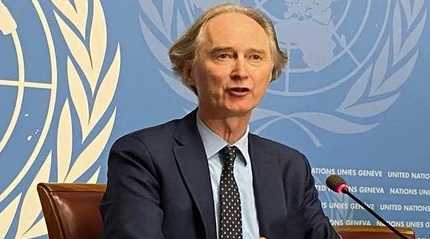
UNITED NATIONS, Oct. 30 (Xinhua) -- UN Special Envoy for Syria Geir Pedersen on Monday warned that spillover of the Israeli-Palestinian conflict into Syria has already begun.
Since March 2020, the Syrian conflict has been in a kind of strategic stalemate characterized by static front lines, persistent violence and sporadic escalation, with de facto authorities entrenching their control and five foreign armies present and active, he told the Security Council.
"However, I have long warned that this status quo leaves Syria at risk of drifting into deeper and prolonged fragmentation and that it involves escalation risks of the most frightening kind," he said. "My warnings have grown louder this year as we have seen growing instability and violence, exacerbated by the lack of a meaningful political process. Today, I am sounding an alarm that the situation is now at its most dangerous (point) for a long time."
Pedersen said he is sounding the alarm because, on top of the violence emanating from the Syrian conflict itself, the Syrian people now face a terrifying prospect of a potential wider escalation, given the alarming developments in Israel and the occupied Palestinian territory and the region.
"Spillover into Syria is not just a risk. It has already begun," he said.
Airstrikes, attributed to Israel, have hit Aleppo and Damascus airports several times in the past month. In addition, Israel says it has responded with artillery, mortar and airstrikes toward what they said were a number of launches from Syria toward Israel on the occupied Syrian Golan. The Syrian government says some of its soldiers were killed and injured in these strikes, as well as civilian workers in the strikes on the airports, said Pedersen.
Meanwhile, the United States says its forces have faced multiple attacks by groups that it claims are backed by Iran, including on Syrian territory. Last week, the United States carried out strikes on facilities in Syria that it claims are used by Iran's Islamic Revolutionary Guard Corps and groups it backs. Further exchanges were reported again on Monday, he noted.
"With the wider region at its most dangerous and tense (point) in a very long time, fuel is being added to a tinderbox that was already beginning to ignite. Even before the regional developments, Syria was seeing the worst surge in violence in more than three years," he said.




